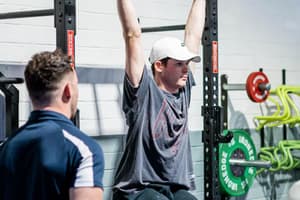Podcast
Questions and Answers
Which component does not fall under health-related physical fitness?
Which component does not fall under health-related physical fitness?
- Body Positivity (correct)
- Cardiovascular Strength and Endurance
- Flexibility
- Muscular Strength
What does the Overload Principle emphasize for gaining fitness?
What does the Overload Principle emphasize for gaining fitness?
- Increasing workload to prompt body adaptation (correct)
- Consistent low-intensity activities
- Repetition of the same routine to avoid fatigue
- Meditation to reduce stress
Which type of muscle contraction involves shortening of the muscle while it generates tension?
Which type of muscle contraction involves shortening of the muscle while it generates tension?
- Eccentric
- Isokinetic
- Isometric
- Concentric (correct)
According to the principle of specificity, what should one do to improve running performance?
According to the principle of specificity, what should one do to improve running performance?
Which of the following is a benefit of performing eccentric muscle contractions?
Which of the following is a benefit of performing eccentric muscle contractions?
How many days per week is a whole body workout traditionally performed?
How many days per week is a whole body workout traditionally performed?
For weight loss to occur, which condition must be met?
For weight loss to occur, which condition must be met?
What type of exercise lasts about 10 minutes or longer and predominantly uses fat as fuel?
What type of exercise lasts about 10 minutes or longer and predominantly uses fat as fuel?
Which macronutrient provides the highest calories per gram?
Which macronutrient provides the highest calories per gram?
What somatotype is characterized by an athletic build and muscularity?
What somatotype is characterized by an athletic build and muscularity?
For strength training, what is the recommended range of repetitions for heavier weights?
For strength training, what is the recommended range of repetitions for heavier weights?
Which energy source is primarily used during high-intensity exercises of short duration?
Which energy source is primarily used during high-intensity exercises of short duration?
What physiological condition occurs during anaerobic exercise?
What physiological condition occurs during anaerobic exercise?
Study Notes
Weekly Workout Structure
- Whole Body: 3 times a week
- Upper Lower Split:
- 2 upper workouts and 2 lower workouts per week
- Upper Body: Legs & Shoulders, Chest & Triceps, Back & Biceps
- Lower Body: Abs & Low Back
- Single Muscle Groups: throughout the week
Weight Goals:
- Maintenance: Calorie Intake = Expenditure
- Loss: Calorie Intake < Expenditure
- Gain: Calorie Intake > Expenditure
Anaerobic vs Aerobic Exercise
- Anaerobic: high intensity, short duration, high lactic acid build-up, using primarily carbohydrate for fuel, lasts about 30-180 seconds
- Examples: Sprinting, basketball, soccer
- Aerobic: low to moderate intensity, long duration, low lactic acid build-up, using fat and carbohydrates for fuel, lasts 10 minutes or longer
- Examples: long-distance running, swimming, cycling
Sources of Energy (kcals)
- Carbohydrate: 4 kcals per gram, 55-65% of total daily kcals
- Examples: fruits, breads, potatoes, rice
- Protein: 4 kcals per gram, 12-15% of total daily kcals
- Examples: meats, fish, nuts, dairy
- Fat: 9 kcals per gram, 20-30% of total daily kcals
- Examples: butter, margarine, oils, salad dressings
- Alcohol: 7 kcals per gram, not a nutritive source of kcals, toxic to the body
Somatotypes (Body Types)
- Mesomorph: Athletic build, short to medium stature, average length limbs, muscular
- Endomorph: Softer physique, not muscular, short to medium stature
- Ectomorph: Long limbs, tall, non-muscular physique
Weights and Repetitions
- Heavier weight, 4-6 reps: power
- Moderate weight, 12+ reps: endurance
- Medium weight, 3-10 reps: strength
Health-Related Physical Fitness
- Components:
- Cardiovascular Strength and Endurance
- Muscular Strength
- Muscular Endurance
- Flexibility
- Body Composition
Principle of Specificity
- To improve at a particular activity, you need to train at that specific activity
- Example: To be a runner, you need to run.
Overload Principle
- In order to see a training effect and progress fitness level, you need an adaptation from the body
- This occurs when you place a challenge the body has to rise to
- This adaptation makes the body stronger
- Components:
- Intensity: difficulty (heart rate, weight, repetitions, etc.)
- Frequency: number of times per week performed
- Duration: length of workout activity
- Progression: small changes = the 10% rule
- Mode: type of workout
Types of Contractions
- Concentric: shortening of muscle with tension
- Eccentric: lengthening of muscle with tension
- Isometric: contraction is held at one angle
- Isokinetic: contraction is performed at the same speed throughout the Range of Motion
Muscle Groups
- Upper Body:
- Chest
- Back
- Shoulders
- Biceps
- Triceps
- Abdominals
- Lower Back
- Lower Body:
- Quadriceps
- Hamstrings
- Outer Thigh
- Inner Thigh
- Calf
- Gluteals
- Hip Flexors
Studying That Suits You
Use AI to generate personalized quizzes and flashcards to suit your learning preferences.
Related Documents
Description
This quiz covers weekly workout structures, including whole body workouts and splits between upper and lower muscle groups. It also explores weight goals related to calorie intake and expenditure, as well as the differences between anaerobic and aerobic exercises. Finally, it highlights the sources of energy in the diet.




